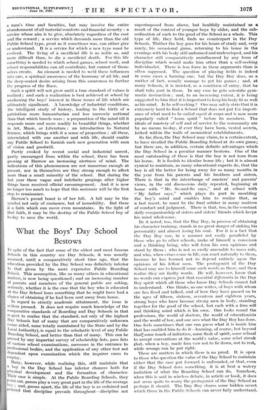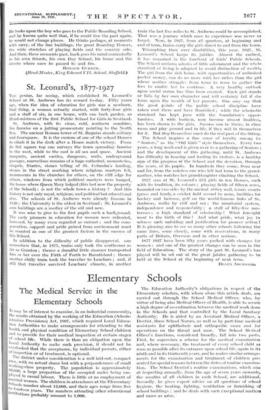What the Boys' Day School Bestows
IN spite of the fact that some of the oldest and most famous Schools in this country are Day Schools, it was usually assumed, until a comparatively short time ago, that the education provided by the Day School was definitely inferior to that given by the more expensive Public Boarding School. This assumption, like so many others in educational matters, is now being questioned ; and an increasing number of parents and members of the general public are asking, seriously, whether it is the case that the boy who is educated at the Day School loses something that he might have had a chance of obtaining if he had been sent away from home. In regard to strictly academic attainment, the issue is seldom pressed. It does not require much knowledge of the comparative standards of Boarding and Day Schools in that respect to realize that the standard, not only of the highest Day Schools but of many that are comparatively unknown (some aided, some totally maintained by the State and by the Local Authority), is equal to the scholastic level of any Public Boarding School, and better than that of many. This can be Proved by any impartial survey of scholarship lists, pass lists of various school examinations, successes in the entrance to professional bodies, and the application of any other test not dependent upon examiruttion which the inquirer cares to
employ.
Many, however, while realizing this, still maintain that a boy in the Day School has inferior chances both for physical development and the formation of. character. Their ease is simple. At the Public Boarding Schools, they Point out, games play a very great part in the life of the average lxhy ; and, games apart, the life of the boy is so ordained and ordered that discipline prevails throughout—discipline not
superimposed from above, but healthily maintained as a result of the control of younger boys by older, and the sub- ordination of each to the good of the School as a whole. This type of life, they hold, finds no counterpart in the Day Schools. Thither the boy goes for his hours of study and, very rarely, his occasional game, returning to his home in the evenings with his body still unformed and undeveloped, and his character still comparatively uninfluenced by any form of discipline which would make him other than a self-seeking individualist. There is less force in these arguments than is often supposed. The question of playing fields is indeed in some cases a burning one, but the Day Boy does, as a matter of fact, usually manage to get his games ; and, at many Schools, it is insisted, as a condition of entry, that he
shall take part in them. In any case he gets scientific gyni-
nastic instruction ; and, to an increasing extent, it is being suggested to bins that it is important to keep his body fit as well as his mind. Is he self-seeking ? One may safely state that it is
extremely hard to find a School that does not put the import- ance of what used to be called esprit de corps and is now more
popularly called " team spirit " before its members. The ideals of mastery of self and of service to the community are by no means: to-day, if ever they have been, vested secrets, locked within the walls of monastical establishments.
So far, then, the Day School may claim, to a certain extent, to have rivalled the Public Boarding School at its own game; but there are, in addition, certain definite advantages which the Day School in a peculiar manner bestows. One of the most outstanding of these is that the boy is not torn from his home. It is foolish to idealize home life ; but it is almost cynical to maintain, as many educational experts do, that the boy is all the better for being away for so many months in the year from his parents and his brothers and sisters. There is that in the interchange of masters' and parents' views, in the old discussions daily repeated, beginning at home with " Mr. So-and-So says," and at school with " My father says," which plays its part in moulding the boy's mind and enables him to realize that, as a last resort, he must be the final arbiter in many matters of conduct and judgment. There is that, too, in the constant daily companionship of sisters and sisters' friends which keeps his niind wholesome.
Be it noted, too, that the Day Boy, in process of obtaining his character training, stands in no great danger of sinking his personality and almost losing his soul. For it is a fact that the Day Boy can, in a manner not easily paralleled by those who go to other schooLs, make of himself a conscious and a thinking being, who will form his own opinions and stand by them ; who is not so easily amenable to mass rule, and who, when crises come in life, can react naturally to them, because he has learned not to depend entirely upon the opinions of his fellow men. The protagonist of the Day School may use to himself some such words as these, and then realize they arc faulty words. He will, however, know that no words can express just that essential differentia in the Day Boy spirit which all those who know Day Schools cannot fail to understand. One thinks, as one writes, of boys with whom one has lived and talked, and of how.they have passed on to the ages of fifteen, sixteen, seventeen and eighteen years, strong boys who have become strong men in body, standing together for the good of the school, but each with a firm will and thinking mind which is his own. One looks round the professions, the world of doctors, the world of educationists and the world of law, and one sees what the Day Boy has done. One feels sometimes that one can guess what it is inside him that has enabled him to do it—learning, of course, but beyond that some touch of initiative, some flash of spirit, some refusal to accept conventions at the world's value, some rebel streak that, when a boy, made him vow not to lie down, not to rest, while wrongs can be put right.
These are matters in which there is no proof. It is open to those who question the value of the Day School to maintain either that the case put forward is unfounded, or that, even if the Day School does something, it is at best a watery imitation of what the Boarding School can do. Somehow, when this is said in wireless debate, in article or book, it does not seem quite to worry the protagonist of the Day School as perhaps it should. The Day Boy shares some hidden secret which those in the Public Schools can never fully understand.
He looks upon the boy who goes to the Public Boarding School, and he knows quite well that, if he could live the past again, he would not change places. He thinks perhaps, at moments with envy, of the fine buildings, the great Boarding Houses,- the wide stretches of playing fields and the country side. And then, these moments past, back goes his mind contentedly to his own friends, his own Day School, his home and the streets where once he passed to. and fro.
Roximas GURNER.
(Head-Master, King Edward VII. School, Sheffteld:)



























































 Previous page
Previous page